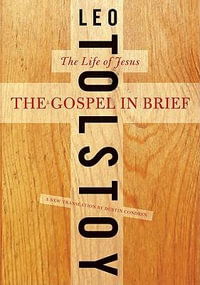The year is 1910. "Anna Karenina" and "War and Peace" have made Leo Tolstoy the world's most famous author. But fame comes at a price. In this fascinating look at a tortured genius on the eve of death, Jay Parini presents Tolstoy's autobiographical writing alongside letters from loved ones to paint a portrait of the great author's final year. Desperate to find respite from his troubled marriage, Tolstoy ventures into the wilderness in search of isolation, only to find a battle for his soul and legacy that offers no peace. "Last Steps" puts a literary giant's life and work in perspective as it bears witness to his struggle to reconcile the two.'I think our life here has meaning only when we live in accordance with the commandment to love one another'
This new selection brings together the pivotal writings – essays, diaries and letters – from Tolstoy's turbulent later years, when he became increasingly tortured by personal and spiritual crises. It includes A Confession (1884) and other pieces in which he expressed his unorthodox version of Christianity, which eventually led to his excommunication by the Church. Here too are essays championing social justice, pacifism and various moral causes, including 'The First Step', a defense of vegetarianism; writings on aesthetic issues – such as 'What is Art?' (1896), a passionate argument that art must express ethical values – as well the famous, controversial 'Shakespeare and the Drama' (1906). Together these pieces show the force and fervour of Tolstoy's late writing to the full, shedding new light on his life and work during the last three decades.
This volume is edited by Jay Parini, author of The Last Station: A Novel of Tolstoy's Final Year, with an introduction placing the works of Tolstoy's final decades in their biographical and literary context.
Edited with an introduction by JAY PARINI
Translations by AYLMER MAUDE, LEO WIENER, and R.G. CHRISTIAN
About the Author
Count Leo Tolstoy was born in 1828. He took part in the Crimean War, and married Sofya Andreyevna Behrs in 1862. Over the next fifteen years they had thirteen children and Tolstoy managed his vast estates in the Volga Steppes, continued his educational projects, cared for his peasants and wrote War and Peace (1869) and Anna Karenina (1877). A Confession (1879-82) marked a spiritual crisis in his life. In 1901 he was excommuincated by the Russian Holy Synod. He died in 1910, in the course of a dramamtic flight from home, at the small railway station of Astapovo.
























